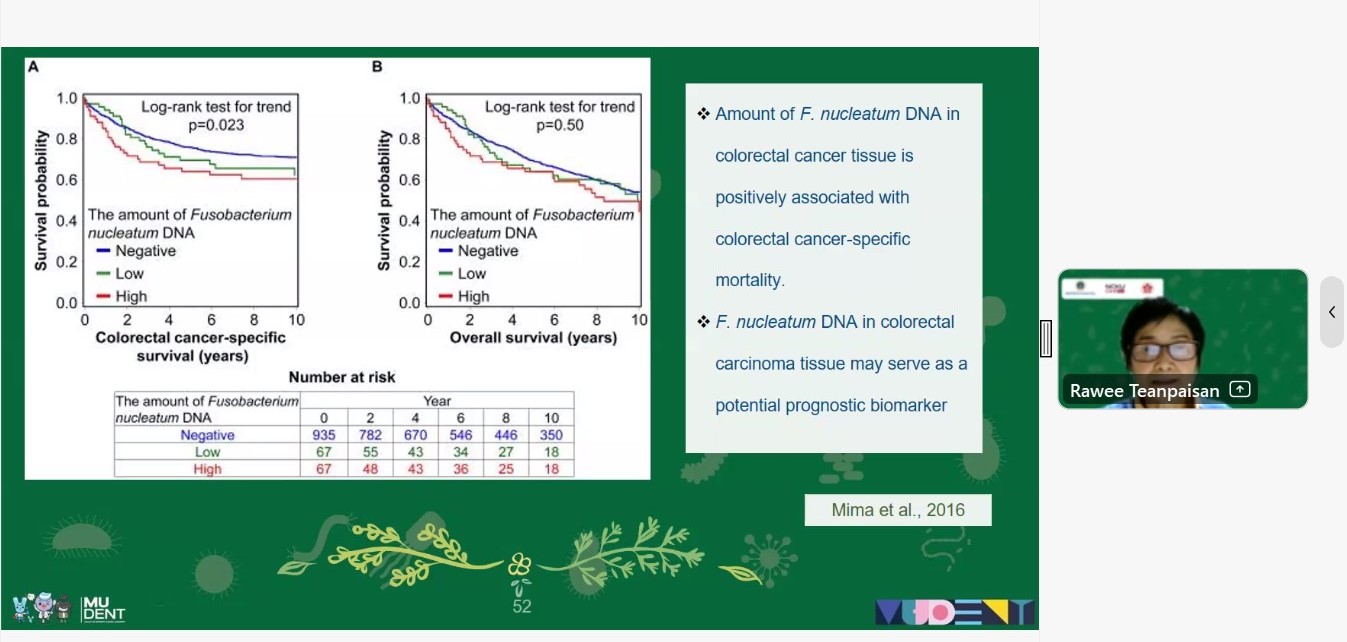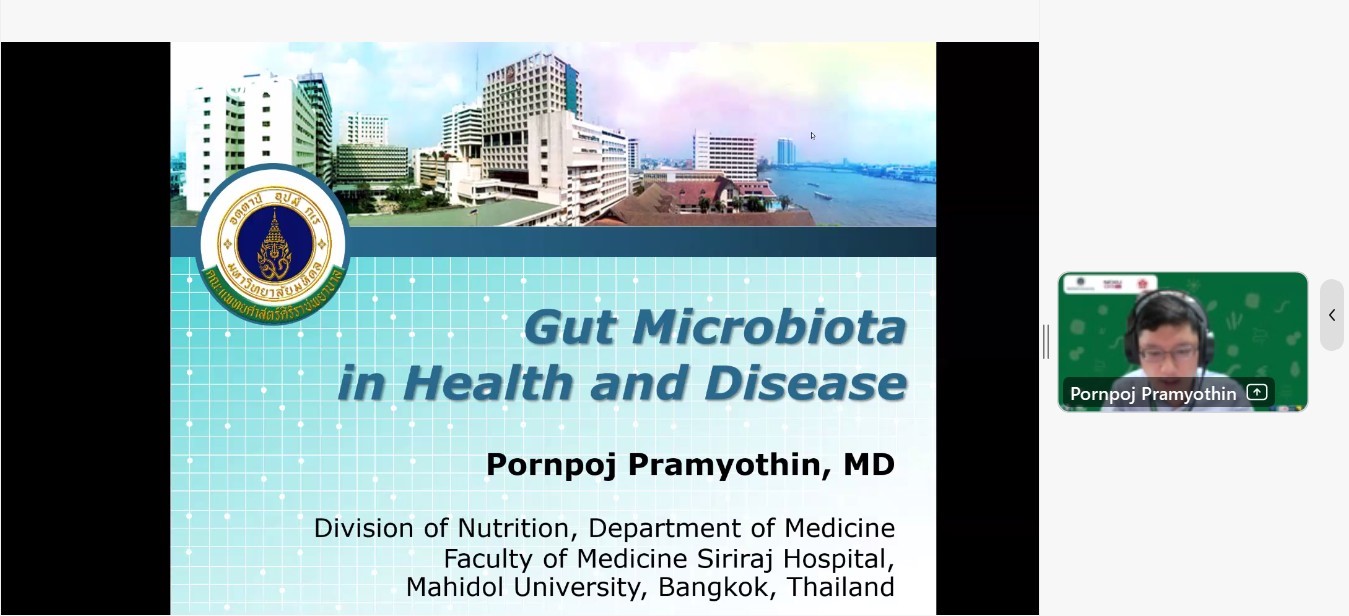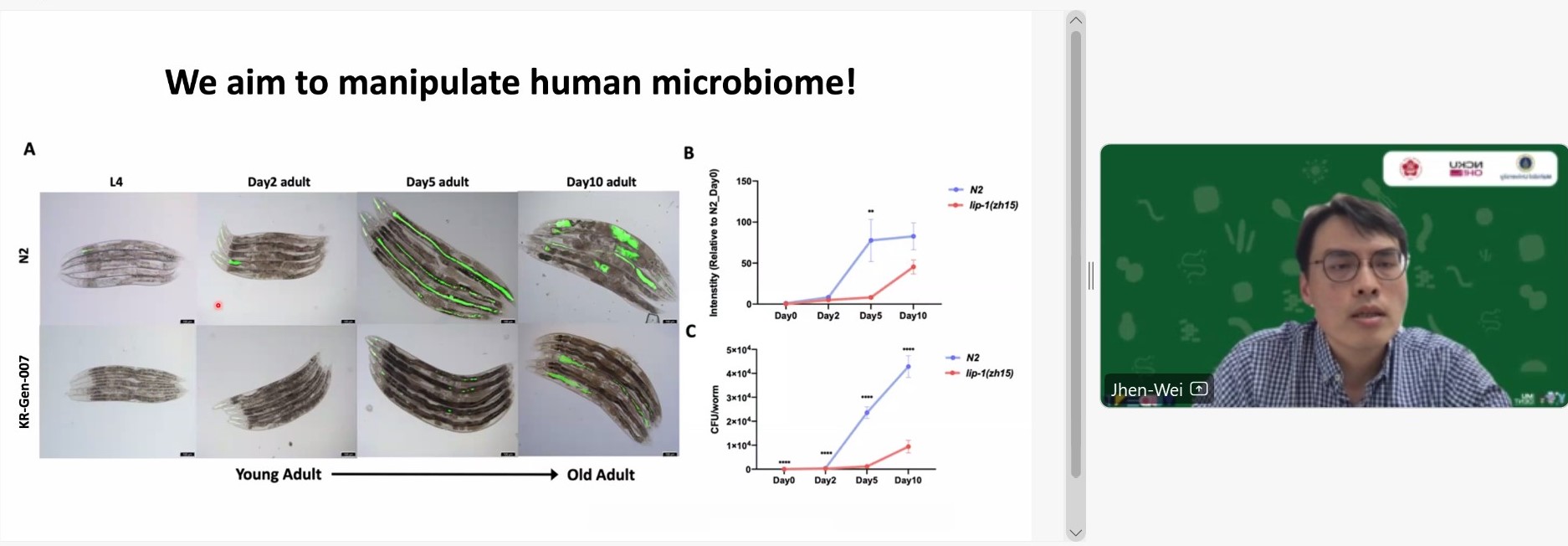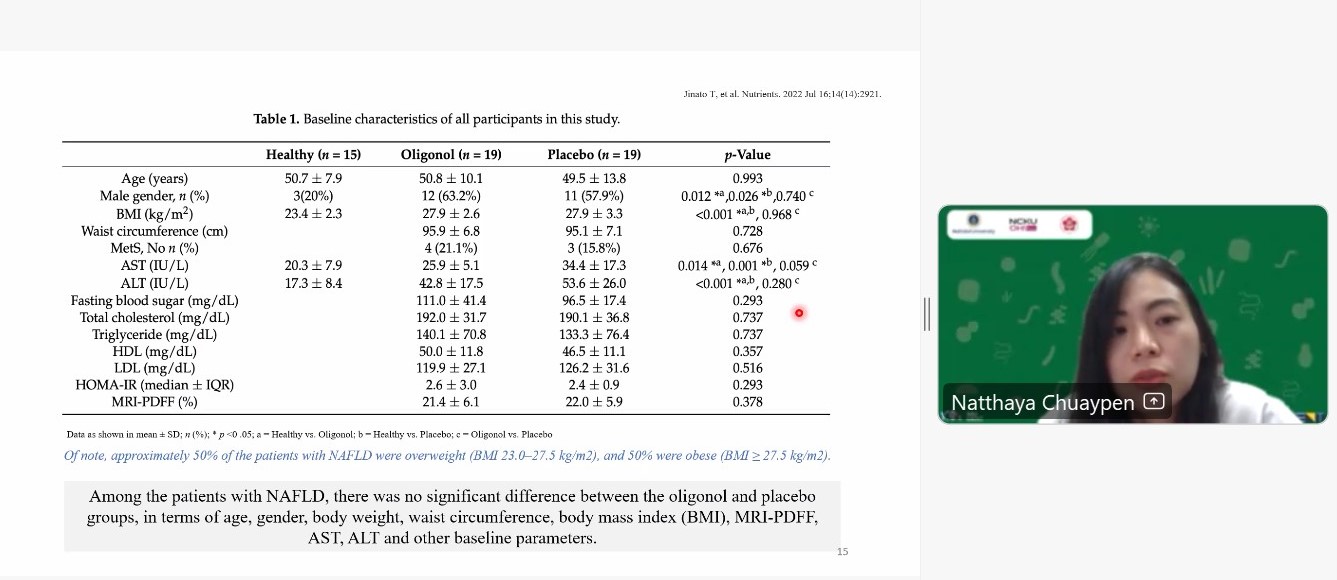Thailand Business
2023 NCKU Thailand Webinar on “From Bacteria to Better Health: The Science Behind Probiotics and Microbiome”
2023-04-10

National Cheng Kung University Overseas Hub in Thailand located at Faculty of Dentistry, Mahidol University, Bangkok, Thailand and Department of Medical Laboratory Science and Biotechnology, NCKU, Taiwan co-hosted a webinar on the scientific update of probiotics and microbiome. The webinar was titled “From Bacteria to Better Health: The Science Behind Probiotics and Microbiome” was held on March 31st, 2023 and was hosted by Prof. Waranun Buajeeb, Director of NCKU Overseas Hub in Thailand and Prof. Tzu-Fun Fu from National Cheng Kung University. The webinar was joined by four speakers, Prof. Rawee Teanpaisan, Asst. Prof Pornpoj Pramyothin, Asst. Prof. Jhen-Wei Ruan and Dr. Natthaya Chuaypen, who shared their knowledge and research on the topic.

The first speaker, Prof. Rawee Teanpaisan from the Department of Oral Diagnostic Sciences, Faculty of Dentistry, Prince of Songkla University, Hat Yai, Thailand talked about the systemic interactions of microorganisms in the oral cavity and gut, which play a crucial role in human health and disease development. She talked about the mechanism of action of probiotics, specifically the competence for nutrients and adherence sites, and production of antimicrobial substances that inhibit pathogens to produce beneficial effects. According to Prof. Teanpaisan, the oral cavity and gut contain numerous microorganisms that interact with each other and with the human host. The balance of microorganisms in the oral cavity and gut is essential for maintaining good oral and systemic health. She highlighted that probiotics are live microorganisms that, when administered in adequate amounts, can confer a health benefit to the host. She also gave examples of studies that considered the oral effects such as caries and periodontal disease decreasing effects of probiotics. She emphasized that the most of the beneficial effects were dependent on the type of strain used dose, frequency, and form in which it is administered. Prof. Teanpaisan also explained results of different immunological studies related to probiotics, conducted using animal and human models. Finally, she discussed the use of probiotics in systemic diseases. She gave examples of opportunistic pathogens, such as F. nucleatum. P gingivalis, and H. pylori, which can invade the gut from the oral cavity and lead to disbalance of microbiota that can chronically affect the host immunity and eventually lead to systemic diseases and cancer. She pointed out that several ongoing studies are investigating the beneficial effects of probiotics on systemic diseases. Moreover, she concluded that there are many scientific evidences on the health benefits of probiotics in dentistry and medicine, but she pointed out that large-scale studies are still required to verify the results.

The second speaker, Asst. Prof. Pornpoj Pramyothin from the Division of Clinical Nutrition, Faculty of Medicine, Siriraj Hospital, Mahidol University, Bangkok, Thailand, talked about the gut microbiota in health and disease and how these microorganisms change based on the dietary habits, physical and psychological stress, medical condition, life style, geography, and age of the individual. He discussed that these microorganisms are highly unique to each individual and is generally stable with a high diversity of microbial species. Asst. Prof. gave several examples of dysbiosis, where an unhealthy gut microbiota can lead to loss of protective mucin layer leading to loss of epithelial integrity and a “leaky gut”. He discussed that a leaky gut can stimulate immune response in the body and explained the gut-lung axis by using Covid-19 as an example and the reasons why in some patients the symptoms of Covid-19 were exasperated. He also explained the gut-brain axis and how the gut microbiota can affect brain functions by interacting with chemical signals, hormones, and inflammatory cytokines, using examples of metabolic disorders such as obesity and Type 2 diabetes mellitus. He pointed out judicial usage of antibiotics is important to prevent dysbiosis and usage of prebiotics to encourage healthy gut microbiota. He also explained concepts of bacterial transplantation and bioengineered commensals which can be transferred directly to the host to prevent dysbiosis. However, he is also pointed out that there is a limited generalizability of studies and a lack of consensus due to high individual variabilities. Asst. Prof. Pramyothin concluded that the gut microbiota is unique to each individual and plays a crucial role in maintaining health, and dysbiosis of microbiota can lead to diseases by affecting the gut-lung and gut-brain axis.

The third speaker, Asst. Prof. Jhen-Wei Ruan from Department of Medical Laboratory Science and Biotechnology, College of Medicine, National Cheng Kung University, focused on the role of host-mediated mechanisms in controlling gut microbiome plasticity and dynamics. He discussed that a restricted focus on only microbe-to-host effects on human physiology can be misleading. Prof. Ruan gave examples of mammals in which the microbial composition of the microbiota is constantly rearranged for rapid adaption to fast-changing environments. Therefore, he discussed that understanding the interplay between host control and microbial competition is essential. In his presentation, Prof. Ruan discussed about host genetics perturbation that could cause dysbiosis. Although in some situation the microbiota can be recovered, in some persistent perturbation, e.g. long antibiotics usage, the microbiome is permanently changed. Long term antimicrobial usage can also alter the gut microbiota hierarchy. In such situations, microbial and transport hubs will play an important role in microbial remodeling. He also explained some critical host control factors in monitoring microbial arrangement, and shared his research results on a cold inducing metabolite, which could induce significant adipose browning in mice and lead to reduction of obesity as well as reduction of lipid accumulation in liver. He also talked regarding new methods to manipulate human microbiome to treat diseases and develop new medicines.

Dr. Natthaya Chuaypen from Center of Excellence in Hepatitis and Liver Cancer, Department of Biochemistry, Faculty of Medicine, Chulalongkorn University, Bangkok, Thailand, shared her research experience on the topic of “The Beneficial Effect of Polyphenol-rich Litchi on Gut Microbiota in Patients with Non-alcoholic Fatty Liver Disease (NAFLD)”. She emphasized on the mechanism and severity of NAFLD and its incidence in the population. She also talked about gut-liver axis, a bi-directional communication, which when altered can affect liver functions. She discussed the potential use of polyphenols obtained from litchi seed extract to prevent obesity and alter gut microbiota to treat NAFLD. In her research, adults with grade ≥2 steatosis as defined by MRI-PDFF of ≥11%, were randomly assigned to receive either oligonol, a litchi-derived polyphenol, or placebo for 24 weeks. The alteration in the MRI-PDFF and gut microbiota composition assessed by 16S ribosomal RNA sequencing were examined in 38 patients. In her observations, there was a significant reduction in the MRI-PDFF between week 0 and week 24 in the oligonol group, while there was a non-significant decrease in the placebo group. She also noted a significant improvement in alpha-diversity in both groups. The oligonol-induced microbiota changes were characterized by reduced abundance of pathogenic bacteria, including Dorea, Romboutsia, Erysipelotrichaceae UCG-003 and Agathobacter, as well as increased abundance of short-chain fatty acids (SCFAs)-producing bacteria, such as Akkermansia, Lachnospira, Dialister and Faecalibacterium. In summary, Dr. Natthaya’s study provided evidence that supported that oligonol improves steatosis through the modulation of gut bacterial composition. Her results also supported the beneficial and complementary role of oligonol in treating NAFLD.

The webinar was attended by a large number of students, researchers, and healthcare professionals. The participants were able to interact with the speakers and ask questions, which led to a lively discussion which was led by from the front by Prof. Tzu-Fun Fu and Prof. Waranun Buajeeb. The webinar provided a scientific update on probiotics, while highlighting valuable insights into the complex interactions between microorganisms and the human host, and the potential applications of this knowledge in improving human health. Overall, the webinar was a success and was a noteworthy collaborative partnership between NKCU Overseas Hub in Thailand and Department of Medical Laboratory Science and Biotechnology, NCKU, Taiwan.
Keyword: